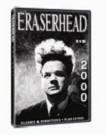|
|
||||
|
|
by Donald Levit  A fat failure at the 1976 San Francisco Film Festival and on release the following year, Eraserhead has since picked up considerable cult steam on the The surrealistic or nightmarish or just repulsive eighty-nine minutes did not exactly put director/producer/composer-lyricist (with some Fats Waller)/editor/production designer-art director/sound and SP-EFX man David Lynch on the mainstream map. But they did open doors to those who envisioned unsettling talent on the horizon and soon found critical vindication in Elephant Man and much green in Blue Velvet and TV’s Twin Peaks (though neither with its movie prequel, Twin Peaks: Fire Walk With Me). With many surnamed Lynch among crew and those deserving of “special thanks,” the career-starting cult favorite is loosely framed by a Man in the Planet (Jack Fisk, husband of “special thanks” Sissy Spacek) and unrolls in an unidentified bleakly industrial city. Outside information reads The City of Brotherly Love and not the Montana-born director’s usual small town Hair and trouser cuffs teddy boy high, the schlub antihero lives in Room 26 of a depressed residence hotel, his window giving at a few inches on a brick wall, the whole sporting dead bushes in piles of dirt and the only other inhabitant a Beautiful Girl Across the Hall (Judith Anna Roberts). This dark neighbor oozes availability, but faithful Henry trudges through apocalyptic factoryscapes to visit spastic blonde sweetie Mary (Charlotte Stewart) and her weird family. Father Bill (Allen Joseph) roasts oddly alive miniature chickens and with frozen smile exhibits his frozen arm, and catatonic Grandmother (Jean Lange) smokes while Mother (Jeanne Bates) helps her mix the salad and, vampire-kissing him, informs the bashful suitor that Mary is pregnant, so they must marry. The non sequiturs and long dining room silences strike some as uproarious but, like the entire film, are awkward and insufferable for most. Switch to the newlyweds, he bumbling and she unsuccessfully spooning pabulum into their upturned offspring, a slimy moaning E.T. head whose snaky neck disappears into swaddling best described as a shrouded hamantasch. Incapable of bearing any more, she packs and goes home to Mother -- as do many of the audience -- leaving the single father to fend as best he can. While slobbering Junior goes through atrocious chickenpox carbuncles, from a mail pigeonhole Daddy retrieves a miniature pepper-shaped growth from an even more minuscule box-within-a-box and guards it in a wood cabinet, is seduced by the “locked-out” resident of Number 27, and dreams or actually experiences the vaudeville stage singing of a mincing tiny-voiced Lady in the Radiator (Laurel Near) reminiscent of his absent wife with added John Merrick Elephant Man cheeks, her unattended act punctuated by falling sperm-embryo-Offspring squishies. Fans and favorable commentators find in this a howling black critique of the deracinated nuclear family and parental hatred spawned by a dehumanized industrial society. Backed by expressionistic sets, spare lighting and in-film bulbs that sputter and hiss, as well as Lynch’s own buzzing mechanical score -- he has composed an Industrial Symphony No. 1 for experimental theater -- this bizarre controversial feature début is in line with the then Philadelphia art student’s earlier animated-and-live The Grandmother, thirty-five minutes about an unhappy incontinent child who grows an idealized grandmother from a pod. The feature’s title does not refer to the monstrous mutant baby but presumably to a late sequence where, on the stage, Henry literally loses his head but regrows the infant’s while his own is flooded in blood, scalped, thrown away but rescued by a passing boy (Thomas Coulson) and sold to an assembly line which cores the skull to make lead pencils with erasers. Droves will not make it to a last conscious act of infanticide, leading only to the insatiable creature’s mouth replicating to fill the screen, a dream embrace between Henry and Miss Radiator Lady, a hole in the burnt-out cinder of a planetoid, and perhaps nothing. Suggestive of “dark and troubling things,” begging for the interpretation which Lynch has always refused to provide, Eraserhead leaves no viewer cold. Whether there is more here than meets the horrified eye, is debatable. The devoured hand and slashed eyeball of Dalí and Buñuel’s Un Chien Andalou continues a film society standard even though the painter would later abjure cinema as art. But there is a mischievous quality to the Spaniards’ intended effect, the same as seventy-five years later in Japanese shockmaster Takashi Miike’s “Yakuza horror theater” Gozu. David Lynch has never been playful, and he confronts a personal darkness rather than a commonly shared racial angst. (Released by Paramount; not rated by MPAA.) |
||
|
© 2025 - ReelTalk Movie Reviews Website designed by Dot Pitch Studios, LLC |



